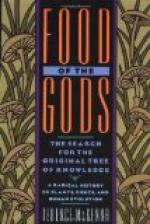But this was not the only medicinal property attributed to “the food of the gods,” for the Aztecs used to prescribe as a cure for diarrhoea and dysentery a potion prepared of cacao mixed with the ground bones of their giant ancestors, exhumed in the mountains. Such a very active principle was sure to make its enemies too, and several amusing attacks have survived to witness their own refutation. It was regarded by some as a violent inflamer of the passions, which should be prohibited to the monks; for, as one writer puts it, “if such an interdiction had existed, the scandal with which that holy order has been branded might have proved groundless.” As late as 1712, after its use had become established in this country, the mentor of the Spectator writes: “I shall also advise my fair readers to be in a particular manner careful how they meddle with romances, chocolates, novels, and the like inflamers, which I look upon as very dangerous to be made use of during this great carnival” (the month of May).
[Illustration—Drawing: MEXICAN DRINKING-VESSELS, ROLLING-PIN AND WHISK.]
Some accounted for the assumed ill-effects of cocoa to its admixture with sugar in the form of chocolate, for a few years earlier a London doctor had declared that “coffee, chocolate, and tea were at the first used only as medicines while they continued unpleasant, but since they were made delicious with sugar they are become poison.” Similarly, an anonymous assailant in a pamphlet “Printed at the Black Boy, over against St. Dunstan’s Church, in Fleet Street,” exclaims:
“As for the great quantity of sugar which is commonly put in, it may destroy the native and genuine temper of the chocolate, sugar being such a corrosive salt, and such an hypocritical enemy of the body. Simeon Pauli (a learned Dane) thinks sugar to be one cause of our English consumption, and Dr. Willis blames it as one of our universal scurvies: therefore, when chocolate produces any ill effects, they may be often imputed to the great superfluity of its sugar.”
[Illustration—Black and White Plate: Cacao Tree, Trinidad.]
In the New World fewer questions were raised, and the only conscientious objection appears to have been felt by a Bishop of Chiapa, whose performance of the Mass was disturbed by its use. The story is told in Gaze’s “New Survey of the West Indies,” published in 1648, and is worth repetition. It is well to bear in mind his information that “two or three hours after a good meal of three or four dishes of mutton, veal or beef, kid, turkeys or other fowles, our stomackes would bee ready to faint, and so wee were fain to support them with a cup of chocolatte.”




